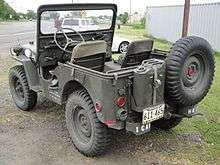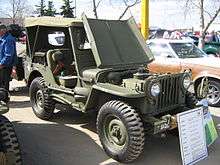Willys M38
| Willys M38 | |
|---|---|
|
A restored Willys M38 | |
| Type | 1⁄4 short ton (230 kg)[lower-alpha 1] 4x4 Utility truck |
| Place of origin | United States |
| Production history | |
| Manufacturer | Willys-Overland |
| Produced | 1949–1952[1] |
| No. built | more than 60,000 produced[1] |
| Specifications | |
| Weight | 2,625 lb (1,191 kg) Empty |
| Length | 133 in (3.38 m) |
| Width | 62 in (1.57 m) |
| Height | 62 in (1.57 m) |
|
| |
| Engine |
Willys MC[2] 51 hp (38 kW) |
| Transmission | 3 spd. x 2 range trf. case |
| Suspension | Beam axles on leaf springs |
| Fuel capacity | 11 US gal (42 l) |
Operational range | 220 mi (354.1 km) |
| Speed | 60 mph (97 km/h) |
The Willys M38 or Willys MC was a 1/4 ton four-wheel drive utility truck made by Willys between 1949 and 1952. It replaced the World War II Willys MB and Ford GPW models, and had a total production of more than 60,000 units.[1] The M38 was a military version of the then-current civilian Jeep CJ-3A.[1] The M38 differed from the CJ-3A in numerous ways, including a reinforced frame and suspension,[3] waterproof 24-volt electrical system,[1] sealed vent system for the engine, transmission, transfer case, fuel system[1] and brake system. Some M38 jeeps were assigned to the Korean theatre of operations, but the majority of vehicles used in that conflict were rebuilt World War II vintage. Approximately 2,300 M38 Jeeps were manufactured by Ford of Canada for Canadian Armed Forces in 1952, designated as the M38-CDN jeep. Its successor was Willys M38A1.
The M38 windshield could be folded flat for firing and the body was equipped with a pintle hook for towing and lifting shackles front and rear. The headlights were no longer recessed as on previous models, but protruded with a guard wire in front. The "pioneer" tools (axe and shovel) which were carried on the MB's driver side were transferred to the passenger side of this vehicle.[4]

Dimensions
The M38 had an empty weight of 2,615 pounds (1,186 kg) and a gross vehicle weight of 3,825 pounds (1,735 kg) on road.[5] The wheelbase was 80 in (2,032 mm), ground clearance was 9 1⁄4 in (235 mm) at the rear axle, maximum overall height was 67 1⁄4 in (1,708 mm), minimum width was 62 in (1,575 mm) and overall length was 132 15⁄16 in (3,377 mm).[6]
Engine
- Bore/Stroke: 3 1⁄8 in × 4 3⁄8 in (79 mm × 111 mm)[2]
- Compression Ratio: 6.48:1
- Displacement: 134.2 cubic inches (2,199 cc)[2]
- Power: 60 hp (45 kW) at 4000 rpm[2]
- Torque: 105 lb·ft (142 N·m) at 2000 rpm[2]
- Main Bearings: 3
- Carburetor: Carter YS 637S, 1 1⁄4 in (32 mm) downdraft[7]
Powertrain
The entire engine air intake and the axle system was fully vented to allow for operation while submerged under water. Its full-floating front axle (Dana 25) was supported by the wheel hub, rather than the axle itself, and provided greater load capacity. The rear axle (Dana 44) was semi-floating. Its drivetrain was the L-head 134.2 cu in (2.2 L) with a T-90 transmission and the Dana 18 transfer case.
A few M38 Jeeps were fitted with a transmission power take-off (PTO) driven winch. This feature was not used in regular production models due to increased weight on the front of the vehicle, as well as additional maintenance requirements.

Electrical system
The electrical system was upgraded to a 24 volt system which required dual 12 volt batteries connected in series. Its ignition and electrical systems were waterproof; a handy feature in rainy environments and where deep river fording was necessary.
See also
- List of U.S. military vehicles by supply catalog designation
- List of U.S. military vehicles by model number
- Jeep trailer (M100)
Notes
Footnotes
- ↑ Off-road load rating
Citations
- 1 2 3 4 5 6 Brown 1994, p. 64.
- 1 2 3 4 5 TM-9-804– 1⁄4 4x4 Utility truck M38, p.89
- ↑ Willys Jeep Parts Specialists
- ↑ M38 Jeep Reference Guide, Miller 2009
- ↑ TM-9-804– 1⁄4 4x4 Utility truck M38, p.6
- ↑ TM-9-804– 1⁄4 4x4 Utility truck M38, p.3
- ↑ TM-9-804– 1⁄4 4x4 Utility truck M38, p.109
References
General
- Brown, Arch (1994). Jeep: The Unstoppable Legend. Lincolnwood, IL US: Publications International. p. 64. ISBN 0-7853-0870-9.
Technical manuals
- "TM-9-804 1⁄4 4x4 Utility truck M38". US Dept. of the Army. September 1950. Retrieved 3 Dec 2014.
- "TM-9-1804A Engine (Willys-Overland Model MC)". US Dept. of the Army. June 1951. Retrieved 3 Dec 2014.
- "TM-9-1804B Power train body and frame". US Dept. of the Army. 16 Jul 1952. Retrieved 3 Dec 2014.
- "TM-9-8012 Operation and Maintenance". US Dept. of the Army. 12 Jan 1956. Retrieved 3 Dec 2014.
- "TM-9-2800-1953 Military Vehicles". US Depts. Of the Army and Air Force. February 1953. p. 154. Retrieved 27 May 2014.
External links
| Wikimedia Commons has media related to Willys M38. |
- http://www.willysmjeeps.com
- http://www.g503.com/
- http://www.olive-drab.com/idphoto/id_photos_m38.php3